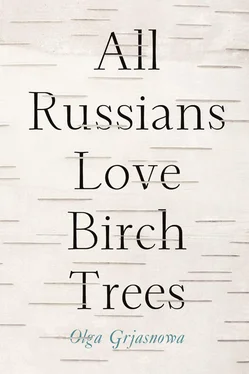“I can’t hear it,” said Konstantin. “It’s too quiet.”
We held the phone closer to the screen.
“Wisdom cometh by suffering,” translated Konstantin.
“Why are they quoting from the Oresteia ?” Cem asked.
“They are Greeks,” said Konstantin.
“Call them again,” said Cem.
I lay alone in the double bed, running my hands over the empty half of the bed and trying to find a different sleeping position from my usual one. My thoughts kept returning to his last night. I examined every second, certain that I could’ve averted his death if only I’d woken up earlier. I should have taken a look at the wound the day before. I felt responsible for Elias’s death. Most nights I fell into a restless sleep in the early morning hours and then delayed getting up. I imagined Elisha lying next to me. I would reach out for him and he would be there, lying on his side of the bed, with bent knees and disheveled hair. I would lean over him and wish him a good morning. His stubble would be scratchy. I would touch him. His body would be warm. I would hold on to him and never want to let go. Then he would push me aside, get up, go to the bathroom, come back, and maybe briefly snuggle up again. He would wear clothes that didn’t match. I would make fun of him for it. The sheets still had a faint smell of him and I wore his clothes to sleep. It was only when the morning came that I would look for him in the bed and remember.
Before turning the key in the ignition my father silently folded his hands for a moment over the steering wheel. Not in prayer, but in accordance with a Russian tradition that all travel should begin with silence and in a seated position. After the silence he pulled out and began accelerating immediately, even though we were still in the residential area. The pine-scented air freshener swung wildly from the rearview mirror. Mother smiled contently and sank deeper into her seat. I sat in the back, between Cem and Sami, both of whom were asleep.
Sami’s student visa for the United States had expired. Normally something like this took two weeks, but if the passport lists an Arabic name and Beirut as the place of birth, even German citizenship was of little help. Once a month Sami went to the U.S. consulate, filled out forms, and was assured that it wouldn’t take much longer, just a few weeks, a routine check. This is what he was told, every month, for almost a year.
The glowing red of morning hung heavy in the sky. As my father drove his Volkswagen insistently in the left lane and well beyond the speed limit, giving way to neither BMWs nor Mercedes, my mother looked at him tenderly. Sometimes I asked myself what our life would have looked like if my father had made it into space. I asked myself if he would have been happy then. If my mother would have been happier. Most likely it would have been enough if we had stayed in the Caucasus. Or if I had been a better daughter.
Horst and Elke lived in a peach-colored house in the Mediterranean prefab style that looked a little lost in the eastern German province. An oak tree growing next to a white front door. The curtains drawn. Meticulously cut lawn. Toolshed. Behind their house the village ended.
As we pulled up, they came to the front door, both wearing black. When we got out of the car the doors shut noisily and Elke winced.
My mother hugged Elias’s mother, careful to keep their bodies from getting too close. Father shook Horst’s hand, as firmly as he could. Cem and Sami also offered their condolences. In the hallway, Horst took our coats and passed them off to Elke. Having dealt with the coats, Elke ran her palms over her thighs. Her satin pants were a little on the tight side. She smiled nervously, brushing the hair out of her face. Mother grinned, feeling superior, and pushed her purse into my dad’s hands. She wore a black dress that showed off her underweight figure, high heels, and a pearl necklace from my great-grandmother’s prerevolutionary times.
Cem and Sami, embarrassed, took off their shoes. Elke started asking questions. Whether we had found the way easily, how the drive had been, when we’d left, if it hadn’t been too strenuous a drive. The questions came at a machine gun pace, but no one answered. Horst pointed at a brown leather couch. Seven coffee cups and pieces of cake had been placed on the coffee table. The room was a perfect German Democratic Republic still life.
“That’s from the bakery. Right around the corner.” Horst’s voice trembled. He jerked up and closed the window, blocking out all sounds from outside — chirping birds and children laughing in the distance.
After a while, when nobody could bear the silence any longer, Cem asked, “Do you collect clocks?”
On the opposite wall hung dozens of clocks, carved from wood and painted. Their collective ticking amounted to a nerve-wracking clatter.
“No,” said Horst, the alcoholic.
“I see,” Cem nodded.
Sami choked on the cake and my father patted him on the back.
“You’ve got quite a few, though.”
Elke placed her chubby hand on Horst’s knee and smiled at us. “They were my father’s.”
“Did he collect clocks?”
“Yes.”
Horst cleared his throat and asked me, “Did you bring his things?”
“Since you may not have the space for them,” Elke said in a soft voice. She ran her hands over her pants and looked past me.
“But it’s your decision.” Horst went over to the window again.
“She doesn’t want to.” My father looked from one to the other. In his eyes, I could see he was ready for a fight, if needed.
My mother hastened to praise the cake. Elke hastened to offer more coffee.
My father said, this time with more emphasis, “If she doesn’t want to, she doesn’t want to.” His German always came out sounding a little rude. In Russian he was more diplomatic. His posture was different when he spoke German: straight back, muscles flexed. His German remained basic, accompanied by a Turkish sound, Russian syntax, and Latin foreign words.
Cem passed the sugar bowl to my father and resumed the conversation: “How many clocks do you have?”
“I don’t know. Strange that you should ask,” said Elke.
“Thirty-six,” Horst replied peevishly.
“ Çüs ,” commented Cem.
“Really? That many? I would never have guessed.” Elke smiled shyly and topped off everyone’s coffee. “Yes, it is exhausting. They always have to be wound up. That takes time.”
“And the noise doesn’t bother you?”
“The noise?”
“Well, the ticking.”
“No.”
“No?”
“No, I guess not.”
We remained silent and looked past each other until my father got up to repark the car.
Horst and Elke drove to the church. My parents trailed them. I wanted to walk and the guys didn’t dare to leave me unsupervised. The village was well kept and clean. There wasn’t much to it: an ice cream parlor, a bank, and round faces without makeup. In the yards poodles went about their business and posters for the right-wing NPD party hung low.
The priest called Elias a good Christian and our brother. There weren’t a lot of mourners. The townspeople and distant relatives kept their composure. The employees of the funeral home had their hands folded. Friends — I wasn’t sure anymore whether his or mine — cried. People stood around in small groups and looked away when our eyes met. Because I had forgotten to change, I wore a gray T-shirt and jeans. Cem’s hand rested on mine. He didn’t let go of me. The smell of incense and rotting flowers hung in the air.
The bells tolled and the guests fought their way through the narrow doors of the church.
I stayed put, alone. The undertakers carried the casket out of the church. I followed them and watched the casket being transferred into the hearse. The motor started. Cem took my hand and sat me in my father’s car. Our car trailed the others toward the new cemetery. We lined up around the edges of the freshly dug grave. The August sun was blinding, searing itself into the mourners’ clothes. The priest was the first to pick up a shovel. Small as a toy. Threw soil onto the casket. Others followed his lead. Spots of sunlight danced on the ground. Elke had slid down to the edge of the grave in a soundless wail. Horst put his arm on her elbow and insistently pulled her up. At the exit the priest offered his condolences. He shook Elke’s hand, patted Horst on the shoulder, and nodded curtly at me. A chubby woman, the kind of person who looked like she voted for a solid conservative party to avoid any deeper engagement with politics, stopped next to me and whispered, “Are you the girlfriend? He was such a young man. And so beautiful.” Then she blushed. A little piece of lightly browned chicken breast was wedged between her front teeth. But Elisha had really been a very beautiful man.
Читать дальше












